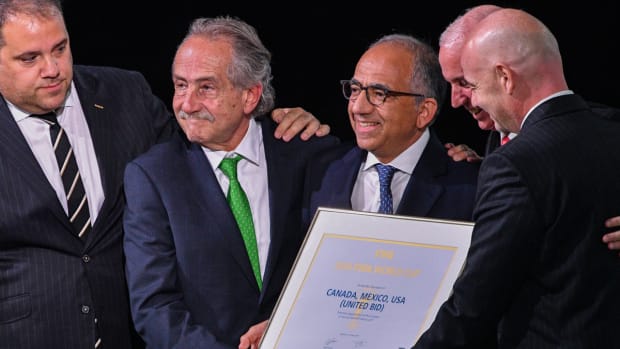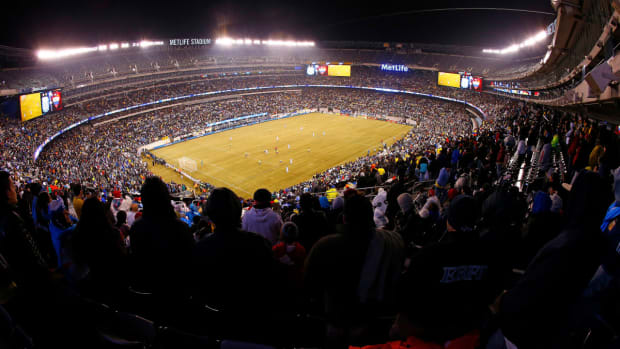FIFA and U.S. Soccer will narrow a field of 17 contenders down to 10 host cities for the USA portion of the 2026 World Cup
Six years may be a long time, but organizing an unprecedented 48-team World Cup across three countries is a complex endeavor. And so every year counts, which is why FIFA and the U.S. Soccer Federation are ready to resume the 2026 World Cup venue selection process—with a few pandemic-appropriate adjustments.
On Tuesday, the 17 American cities and stadiums vying to be selected as a World Cup venue will participate in an online workshop with FIFA and the USSF. The event will be followed by individual meetings over the course of the next month. The workshop originally was scheduled for March in Dallas, but it became an early coronavirus casualty. With co-hosts Canada and Mexico getting their initial meetings done before the region shut down, FIFA felt it was time to start getting the U.S. candidates back up to speed.
“Six years seems like a long time. It’s really not. We’re certainly impatient to get moving on this journey together,” FIFA Chief Tournaments & Events Officer Colin Smith said during a Monday conference call.
“We initially planned that we would finalize the selection process in the spring of ’21. Obviously that was based on us having started this in March and conducting at least, I would say, two sets of inspection visits throughout this year in order to finalize the process. Obviously now that we’ve had to delay that, it’s very difficult to give a final [decision] date, because we don’t know when the start date is,” Smith said of the venue-selection timeline.
“We need a few more weeks to see how things develop and then I would say in quarter three, beginning of quarter four of this year, we would have a better idea of the inspection visit schedule and then the time needed for the selections.”
The joint bid by the USA, Canada and Mexico to host the 2026 World Cup, which will comprise 80 games, envisioned 10 host stadiums in the USA (60 games), three in Canada (10 games) and three in Mexico (10 games).

Canada and Mexico each have only three candidates: Edmonton, Montreal and Toronto in the former, and Guadalajara, Mexico City and Monterrey in the later. In the USA, 34 cities expressed interest in participating at the start. After two rounds of cuts, the 17 that will participate in Tuesday’s workshop remain. Both Chicago and Vancouver declined to bid.
“We’ve got 17 fantastic cities. There’s a great depth there right the way across the U.S., and we’re looking forward to making the selection from those 17 cities.” Smith said.
It’s FIFA’s tournament, and FIFA will have the final say on venues. The USSF will be involved in the process, however, and will have input, especially on matters concerning the sport’s penetration and potential legacy in different markets.
“U.S. Soccer, and Mexico and Canada as well, the associations are key partners throughout this process and will be integral to it,” Smith said. “The final decision will be a FIFA decision, but the journey and the process, recommendations, working through the different aspects in terms of the landscape and what it means for football in the U.S., obviously U.S. Soccer is a critical partner throughout that entire purpose.”
Former USSF CEO Dan Flynn, who’s acting as a “senior advisor” overseeing the venue selection process, said, “I think U.S. Soccer will have a significant influence in the final say.”
Here’s a look at the 17 American locations and stadiums in contention:
The Favorites
Atlanta - Broke MLS attendance records when Atlanta United joined the league in 2017, and is arguably American soccer’s most successful new market. Mercedes-Benz Stadium opened the same year.
Boston - Gillette Stadium is about 20 miles south of Boston, but it has a history of hosting major soccer events. And the Krafts, who own the Patriots and Revolution, are deeply connected at U.S. Soccer.
Dallas - AT&T Stadium has become a go-to venue for major events, including the Concacaf Gold Cup and big friendlies, and probably is a prime candidate to host a semifinal.
Los Angeles — Home of the 1994 World Cup final, the Rose Bowl is L.A.’s official candidate venue. But SoFi Stadium, which was scheduled to be ready by the 2020 NFL season and will seat at least 70,000, could be in frame by the time selections are made.
Miami — Hard Rock Stadium has undergone significant renovations and hosted the Super Bowl in February. Miami’s status as an international city will appeal.
New York/New Jersey — Some have pegged MetLife Stadium, which can be expanded to 87,000 seats, as the early favorite to host the 2026 final. Its predecessor, Giants Stadium, was the site of a semifinal in 1994.
San Francisco/Bay Area — Levi’s Stadium is the likeliest candidate for a second venue in the Pacific time zone. Nearby Stanford Stadium was a 1994 World Cup site.

The Rest
Baltimore — If FIFA wants to be near the nation’s capital but doesn’t like FedEx Field, M&T Bank Stadium is only 35 miles away.
Cincinnati — Now a part of the soccer conversation thanks to FC Cincinnati, and may benefit from Chicago’s absence. Paul Brown Stadium is the venue.
Denver — The only Mountain time zone bidder. Empower Field at Mile High is the potential venue.
Houston — NRG Stadium has hosted two Super Bowls and a Copa América Centenario semifinal.
Kansas City — Arrowhead Stadium missed out in 1994, and the Hunt family, which owns the Chiefs and FC Dallas, is a massive figure in American soccer circles.
Nashville — Another new soccer market. Nissan Stadium has been the site of Gold Cup and U.S. national team matches.
Orlando — Camping World Stadium hosted 1994 World Cup games before it was renovated.
Philadelphia — Lincoln Financial Field has hosted Concacaf Gold Cup finals and other significant matches. Organizers will have to decide whether its proximity to New York is a positive or negative.
Seattle — A hugely successful soccer market. CenturyLink Field will have to have grass installed.
Washington, D.C. — Having a World Cup without including the capital would feel strange. But FedEx Field, in suburban Landover, Md., has its drawbacks.